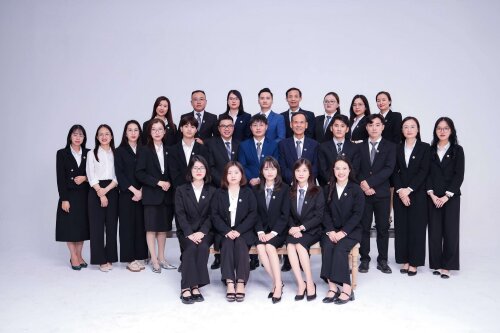Best Family Lawyers in Da Nang
Share your needs with us, get contacted by law firms.
Free. Takes 2 min.
Free Guide to Hiring a Family Lawyer
List of the best lawyers in Da Nang, Vietnam
Vietnam Family Legal Questions answered by Lawyers
Browse our 1 legal question about Family in Vietnam and read the lawyer answers, or ask your own questions for free.
- for divorce,what kind of adultery evidence do i need to prove my spouse is cheating
- i only had text messages of my spouse cheating. what else do i require?
-
Lawyer answer by THE LAM LAW LLC
Thank you for reaching out and sharing your concern. Under Vietnamese law, particularly the Law on Marriage and Family (2014), adultery may be considered a violation of marital obligations and can be grounds for divorce if it causes serious breakdown...
Read full answer
About Family Law in Da Nang, Vietnam:
Family law in Da Nang, like other parts of Vietnam, is governed by the comprehensive guidelines provided by the Vietnamese Law on Marriage and Family. This law covers a wide range of familial matters including marriage, divorce, child custody, adoption, inheritance and personal property matters. In recent years, the Vietnam government has made several significant amendments to make these laws more progressive, taking into account the changing societal norms and values.
Why You May Need a Lawyer:
While some family matters can be resolved amicably without legal aid, a lawyer becomes essential in situations of complex litigation. This can include, for instance, divorce proceedings involving asset division, spousal and child support, or disputes regarding child custody. Furthermore, experienced family lawyers can provide invaluable advice when drafting prenuptial agreements or handling domestic violence cases. Adoption and inheritance rights, too, can often benefit from professional legal guidance.
Local Laws Overview:
The dominant principle of Family Law in Vietnam, and thus in Da Nang emphasizes gender equality and the protection of women and children. Validity of a marriage requires voluntary consent, with prohibitions serving to deter forced marriages. Divorce laws permit dissolution of marriage, but one must provide proper justification for the same. The laws also outline specific rules regarding the shared responsibility of child-rearing, property rights, and inheritance. With regards to adoption, Vietnamese citizens can adopt a child, but conditions apply when it comes to foreigners and overseas Vietnamese.
Frequently Asked Questions:
1. Can a foreigner marry a Vietnamese citizen in Da Nang?
Yes, under Vietnamese law, a foreigner can marry a Vietnamese citizen. However, both parties must meet certain requirements such as being single and capable of independent decision-making.
2. How are assets divided in a divorce according to family law in Da Nang?
Generally, assets acquired by spouses during marriage, or mutually owned assets, are equally divided on divorce. Properties owned by either spouse prior to marriage remain with the respective individuals.
3. What is the legal age for marriage?
The legal age for marriage is 20 years for men and 18 years for women, as outlined by the Vietnamese Law on Marriage and Family.
4. What considerations are made in child custody disputes?
The court considers factors like the emotional bond between the child and each parent, the child's age and health, financial standing of the parents, and other relevant factors that impact the child's welfare.
5. Can non-Vietnamese residents adopt Vietnamese children?
Yes, but the process involves both Vietnamese and international laws. In general, priority is given to Vietnamese citizens or overseas Vietnamese before considering other foreign individuals or couples.
Additional Resources:
If you're looking for further support or advice, governmental bodies like the Da Nang Department of Justice, and organizations such as the Vietnam Women's Union, may prove to be of help. Additionally, various legal aid organizations provide consultation and legal advice for those in need.
Next Steps:
If you believe you need a family lawyer, start by identifying your specific needs. Following this, contact the Da Nang Bar Association or a trusted legal aid organization to find a suitable lawyer. Prepare for your initial consultation by accumulating all relevant documents and questions you may have. Remember, understanding and cooperation with your lawyer would be key to successfully navigate through the legal procedures.
Lawzana helps you find the best lawyers and law firms in Da Nang through a curated and pre-screened list of qualified legal professionals. Our platform offers rankings and detailed profiles of attorneys and law firms, allowing you to compare based on practice areas, including Family, experience, and client feedback.
Each profile includes a description of the firm's areas of practice, client reviews, team members and partners, year of establishment, spoken languages, office locations, contact information, social media presence, and any published articles or resources. Most firms on our platform speak English and are experienced in both local and international legal matters.
Get a quote from top-rated law firms in Da Nang, Vietnam — quickly, securely, and without unnecessary hassle.
Disclaimer:
The information provided on this page is for general informational purposes only and does not constitute legal advice. While we strive to ensure the accuracy and relevance of the content, legal information may change over time, and interpretations of the law can vary. You should always consult with a qualified legal professional for advice specific to your situation.
We disclaim all liability for actions taken or not taken based on the content of this page. If you believe any information is incorrect or outdated, please contact us, and we will review and update it where appropriate.
Browse family law firms by service in Da Nang, Vietnam
Da Nang, Vietnam Attorneys in related practice areas.















